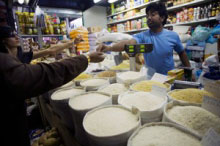



FAO Food Price Index Up Slightly in June
GLOBAL - FAO's Food Price Index rose one percent to 234 points in June 2011 - 39 per cent higher than in June 2010 but four per cent below its all-time high of 238 points in February of this year.
A strong rise in international sugar prices was behind much of the increase, according to FAO.
The FAO Cereal Price index averaged 259 points in June, down one per cent from May but 71 per cent higher than in June 2010. Improved weather conditions in Europe and the announced lifting of the Russian Federation's export ban contributed to the price drop.
However the maize market remained tight because of low 2010 supplies and continued wet conditions in the United States. Prices of rice were mostly up in June, reflecting strong import demand and uncertainty over export prices in Thailand, the world's largest rice exporter.
Sugar rises on Brazil prospects
The FAO Sugar Price Index rose 14 per cent from May to June, reaching 359 points, 15 per cent below its January record. Production in Brazil, the world's biggest sugar producer, is forecast to fall below last year's level.
The FAO Dairy price Index averaged 232 points in June, virtually unchanged from 231 points in May. The FAO Meat Price Index averaged 180, marginally up from May with poultry meat rising three per cent and climbing to a new record, while pig meat prices declined somewhat.
New cereal forecast
Following two consecutive revisions to the US crops and planting prospects for 2011, FAO's latest forecast for world cereal production in 2011/2012 stands at nearly 2 313 million tonnes, 3.3 per cent higher than last year and 11 million tonnes above FAO's last forecast on 22 June.
World cereal utilization in 2011/2012 is forecast to grow 1.4 per cent from 2010/2011, reaching 2 307 million tonnes, just five million tonnes under forecast production.
World cereal stocks at the close of the crop season in 2012 are now expected to stand six million tonnes above their opening levels. While wheat and rice inventories are expected to become more comfortable, coarse grains stocks, especially maize, would remain tight.











